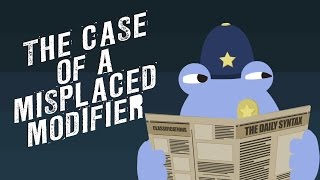(单词翻译:单击)
This just in: "Thief robs town with world's largest chocolate bunny."
最新消息:“窃贼洗劫了城镇(有/用)世界上最大的巧克力兔子。”
Wait, so are we talking about this, or this?
等等,我们是在讨论这个,还是这个?
That's a classic case of a misplaced modifier, a common grammatical mistake that can dramatically change the meaning of a sentence.
这是一个修饰语错置的经典案例,这是一种常见的语法错误,可以戏剧性地改变句意。
And lest you think this is a bit far-fetched, confusing headlines like this appear all the time.
恐怕你会有点不相信,但像这种引发歧义的标题总会出现。
Modifiers are words, phrases, and clauses that add information about other parts of a sentence, which is usually helpful.
修饰语可以是词、短语和从句,它们为句子的其他部分增添信息,通常来说很有用。
But when modifiers aren't linked clearly enough to the words they're actually referring to, they can create unintentional ambiguity.
但如果修饰语与它真正修饰的词连接不清晰的话就会造成无意歧义。
That happens because the modifying words, in this case, "with world's largest chocolate bunny,"
这种情况会发生是因为修饰语,在这个例子里就是“(有/用)世界上最大的巧克力兔子”
modify the wrong thing, the robber's actions instead of the town.
修饰的对象错了,是窃贼的行为而不是城镇。
To correct this particular sentence, we simply rephrase to make it clearer what the modifying phrase is talking about.
为了改正这句话,我们可以改变一下措辞来使修饰的短语更为清晰。
"Town with world's largest chocolate bunny robbed by thief."
改述为“有着世界上最大的巧克力兔子的城镇被窃贼洗劫。”
Now, at least it's clear that the thief wasn't armed with a giant chocolate animal.
现在这句话就明了多了,而不是说窃贼带着一只巨大的巧克力兔子。
Sometimes, modifying words, phrases, or clauses don't appear to be modifying anything at all.
有时候,修饰词、短语或从句好像并没有修饰任何东西。
That's called a dangling modifier.
这叫做悬垂修饰语。

"Having robbed the bank in record time, it was possible to make off with the town's chocolate rabbit as well."
“在飞速洗劫了银行之后,还能偷走镇上的巧克力兔子。”
The modifying phrase in this sentence seems unrelated to anything else,
这句话中的修饰短语似乎并没有与任何东西相连,
and so we're clueless about who the chocolate-loving criminal could possibly be.
所以我们不知道这个喜爱巧克力的窃贼会是谁。
Giving the modifier something to modify will solve the problem.
给修饰语一个修饰对象就会解决这个问题。
Then there's another group called the squinting modifiers because they're stuck between two things and could feasibly refer to either.
还有一种叫做岐形修饰语,因为它们被卡在两样东西之中,修饰哪一个都讲得通。
Often, these modifiers are adverbs, like the one in this sentence: "Robbers who steal chocolate bunnies rapidly attract the outrage of onlookers."
通常,这些修饰语是副词,就像这句里的:“这个窃贼偷巧克力兔子很快引起了旁观者的愤怒。”
"Rapidly" is the modifier, here, but what's not clear is whether it's referring to the speed of the chocolate thievery,
“很快”在这里是修饰语,但不清楚是指偷巧克力很快呢,
or how quickly it alerts the furious onlookers.
还是说很快引起了愤慨的旁观者的愤怒。
To clarify, we can either put the modifier closer to its intended phrase, which works in some cases,
为了使之清晰,我们可以把修饰语放得离修饰对象近一点,有些情况这样是可行的,
or we can entirely reword the sentence so that the modifier no longer squints, but clearly applies to only one part.
或者我们可以改述这句话,从而修饰语不偏向双方,但还是明确地指代一个部分。
"Chocolate bunny-thieving robbers rapidly attract the outrage of onlookers."
“偷巧克力兔子的窃贼很快激起了旁观者的愤怒。”
Justice will eventually come to the chocolate thief, but in the meantime,
正义最终会使巧克力窃贼受到惩罚,但同时
our task is to avoid verbal ambiguity by making it clear which parts of the sentences modifiers belong to.
我们的任务是通过使句中的修饰对象清晰,从而避免歧义。
That way, we can at least maintain grammatical law and order.
这样一来,我们至少能保持原有的语法规则和次序。


